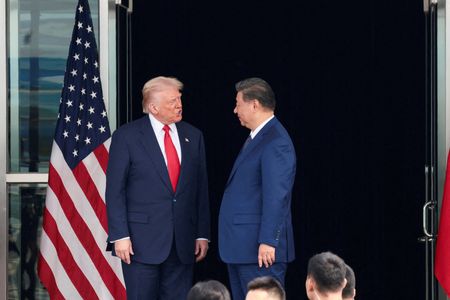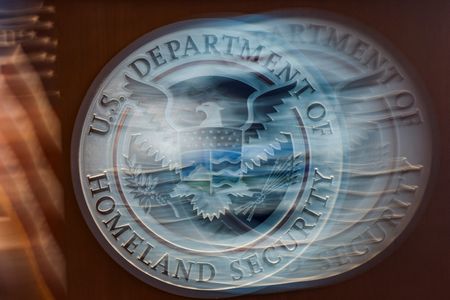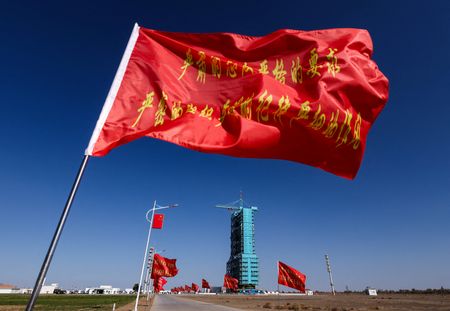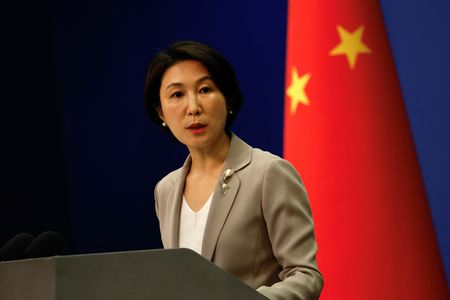By Michael Martina
WASHINGTON (Reuters) -President Donald Trump touted relations with China as “extremely strong” on Monday following a call with Chinese leader Xi Jinping, who told Trump that Taiwan’s “return to China” is a key part of Beijing’s vision for the world order.
The call, not previously flagged by either country, came weeks after the two leaders met in South Korea, where they agreed to a framework for a trade deal that has yet to be finalized.
China is locked in its biggest diplomatic crisis for years with U.S. ally Japan. This month, Japanese Prime Minister Sanae Takaichi said any Chinese attack on democratically governed Taiwan could trigger a Japanese military response.
“China and the United States once fought side by side against fascism and militarism, and should now work together to safeguard the outcomes of World War Two,” Xi was quoted as saying by China’s official Xinhua news agency, adding that “Taiwan’s return to China is an integral part of the post-war international order.”
China regards Taiwan as part of its territory and has not ruled out the use of force to take control of it. The island’s government rejects Beijing’s claim and says only Taiwan’s people can decide their future.
Trump made no mention of Taiwan in a Truth Social post on his “very good” call with Xi, which he said covered many topics, including Ukraine, fentanyl, and U.S. farm products.
“Our relationship with China is extremely strong! This call was a follow up to our highly successful meeting in South Korea, three weeks ago. Since then, there has been significant progress on both sides in keeping our agreements current and accurate,” Trump said.
He said he accepted Xi’s invitation to visit Beijing in April, and had invited Xi for a state visit to the U.S. later in the year.
White House Press Secretary Karoline Leavitt told reporters the call with Xi was focused on trade and lasted about an hour.
“We are pleased with what we’ve seen from from the Chinese, and they feel the same way,” Leavitt said.
Following months of trade tensions triggered by Trump’s tariffs, Xi and Trump reached the framework agreement in South Korea on October 30. Washington agreed not to impose 100% tariffs on Chinese imports and China would hold off on an export licensing regime for crucial rare earths minerals and magnets.
U.S. Treasury Secretary Scott Bessent has said he hoped a final deal on rare earths would be done by Thanksgiving.
China has resumed purchases of U.S. soybeans and halted its expanded curbs on rare earths exports. The U.S. lowered tariffs on China by 10% in exchange for Beijing’s pledge to help curb the flow of chemicals used to make the synthetic opioid fentanyl to North America.
Xi said that China-U.S. ties have stabilized and improved since the meeting.
“The facts again show that cooperation benefits both sides while confrontation hurts both,” he told Trump, urging the two countries to maintain positive momentum.
Xi reiterated that China supports all efforts conducive to peace in Ukraine.
JAPAN’S MISSILE PLANS
China’s readout of the call emphasized Taiwan, an issue neither side mentioned in statements following the South Korea meeting. Trump had said after that meeting that they did not speak about Taiwan, which Beijing consistently raises as a red line in relations with Washington. Weeks later, the U.S. approved a $330 million arms sale to Taipei.
Taiwan expert Bonnie Glaser, of the German Marshall Fund of the United States, said Xi’s Taiwan statement reprised one he made on a visit to Russia in May.
“Xi likely used the opportunity to set out his stance on Taiwan, perhaps because there was a lot of media on the Busan meeting which noted that Taiwan was not discussed,” Glaser said.
Trump has not directly waded into the simmering diplomatic row between Japan and China over Taiwan, though his ambassador to Japan, George Glass, has said the U.S. supports Tokyo in the face of China’s “coercion.”
Earlier on Monday, Beijing criticized Tokyo’s plan to deploy a medium-range surface-to-air missile unit on Yonaguni, an island about 110 km (68 miles) off Taiwan, calling it an attempt to “create regional tension and provoke military confrontation.”
Marvin Park, a former director for Taiwan on the U.S. National Security Council, said the missiles were clearly defensive in nature, with a range of only about 50 km (30 miles), and could not even reach Taiwan.
“China’s deeper fear is about the potential of future Japanese militarization. If they bring in this purely defensive system now, that could make it easier on the Japanese side to advocate for more advanced capabilities in the southwest islands,” said Park, now with the American Global Strategies consultancy.
(Reporting by Xiuhao Chen, Ryan Woo and Michael Martina, David Brunnstrom and Steve Holland; writing by Michael Martina; Editing by Timothy Heritage, Aidan Lewis and David Gregorio)











